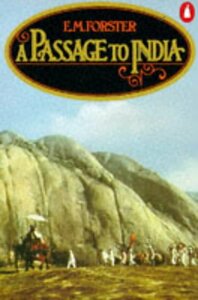You need to sign in or sign up before continuing.
Take a photo of a barcode or cover
emotional
reflective
medium-paced
Plot or Character Driven:
A mix
Strong character development:
Yes
Loveable characters:
Complicated
Diverse cast of characters:
Complicated
Flaws of characters a main focus:
Yes
I don't know if this went over my head or was just dull, but I wasn't a fan. A long novel to revolve around one incident.
slow-paced
Plot or Character Driven:
Plot
Diverse cast of characters:
Yes
This is the first book I read aloud to my first daughter Aurelia, a newborn at the time. It was enchanting.
A Passage to India by E.M. Forster
Harcourt, Inc, 1952
Originally Published 1924
362 pages
Classic; FITG
3.5/5
Source: Bought and read for class
Summary: Adela Quested and Mrs. Moore are British citizens, excited to journey to India and see the scenery. A new friend of Mrs. Moore's, Dr. Aziz invites them to see the Marabar Caves where a most unfortunate incident occurs leading to a court case and aggravating relations between the British colonizers and the colonized Indians.
I was really excited about this but I was left unsatisfied. I was expecting a tale of the clash of cultures as Anglo/Indian relations were explored and gender roles were examined. And to a degree, I got that. But the prose was not to my liking at all. Forster's descriptions of the scenery were so boring (almost Tolkien-esque-the only way I got through LOTR was by skimming the endless scenery descriptions and focusing on the actual plot) and it was very slow-moving. The incident described on the book-flap is Aziz being falsely accused of sexually molesting Adela; do you know when that happens? Nearly halfway through the book! Before that, there is plenty of description and a lot of set-up to establish the personalities of the characters and the relationship between the British and the Indians.
I didn't particularly like any of the characters either. The four main characters are Brits Adela, Mrs. Moore, and college principal Fielding in addition to Indian doctor Aziz. My inability to feel completely connected to any of them soured my opinion of this book. I'm not sure if that was part of Forster's intention. However this is an useful book for study of the time period. Rising nationalism makes an appearance and is a topic I find fascinating.
Overall: I was really disappointed; have I missed something huge with regards to Forster? I'd love to give him another try-any recommendations?
Harcourt, Inc, 1952
Originally Published 1924
362 pages
Classic; FITG
3.5/5
Source: Bought and read for class
Summary: Adela Quested and Mrs. Moore are British citizens, excited to journey to India and see the scenery. A new friend of Mrs. Moore's, Dr. Aziz invites them to see the Marabar Caves where a most unfortunate incident occurs leading to a court case and aggravating relations between the British colonizers and the colonized Indians.
I was really excited about this but I was left unsatisfied. I was expecting a tale of the clash of cultures as Anglo/Indian relations were explored and gender roles were examined. And to a degree, I got that. But the prose was not to my liking at all. Forster's descriptions of the scenery were so boring (almost Tolkien-esque-the only way I got through LOTR was by skimming the endless scenery descriptions and focusing on the actual plot) and it was very slow-moving. The incident described on the book-flap is Aziz being falsely accused of sexually molesting Adela; do you know when that happens? Nearly halfway through the book! Before that, there is plenty of description and a lot of set-up to establish the personalities of the characters and the relationship between the British and the Indians.
I didn't particularly like any of the characters either. The four main characters are Brits Adela, Mrs. Moore, and college principal Fielding in addition to Indian doctor Aziz. My inability to feel completely connected to any of them soured my opinion of this book. I'm not sure if that was part of Forster's intention. However this is an useful book for study of the time period. Rising nationalism makes an appearance and is a topic I find fascinating.
Overall: I was really disappointed; have I missed something huge with regards to Forster? I'd love to give him another try-any recommendations?
As much as I wanted to like it, Forester's style of writing just was not for me. It took me two months to slog through it, and I felt like the majority of the book was just scene-setting - I wished it had been cut down to a long-ish short story.
I wanted to like this. The writing is beautiful. I did not enjoy the story or parts of the philosophy espoused. The audiobook narrator was excellent. Worth the time. I think Forster and I just don't mesh.
ETA - valuable and worth reading for the ideas about colonization and India. I didn't like Forster's comment on religion and marriage. Probably should make that more clear.
ETA - valuable and worth reading for the ideas about colonization and India. I didn't like Forster's comment on religion and marriage. Probably should make that more clear.
“[the Oriental] trusts and mistrusts at the same time…It is his demon, as the Westerner’s is hypocrisy.” (311)
Gah, this was so unexpectedly good. The way Forster weaves themes and symbolism together throughout the novel is truly magical.
Not the kind of Forster I'm interested in reading. I don't think this aged well.






